The ECB returns from its summer recess to a rate decision meeting. Given the euro area’s solid economic situation and inflation stabilizing near its target, the likelihood of further rate cuts appears low. The ECB's communication is expected to be similar to its July press conference, although several issues could lead to either euro strength or weakness.
ECB Nears Inflation Target
Eurozone inflation has stopped falling, a trend observed across key member states. This prolonged stabilization puts the ECB in a comfortable position, alleviating the need for further rate cuts. The deposit rate of 2.0% provides an additional cushion, allowing for a potential cut if significant economic problems arise.
Many commentators suggest the ECB may reconsider rate cuts later this year if a trade agreement with the United States leads to further disinflation and a strong euro exacerbates these processes. However, it's too early to consider this scenario, although a mention of such speculation by Lagarde at the press conference could weaken the currency.
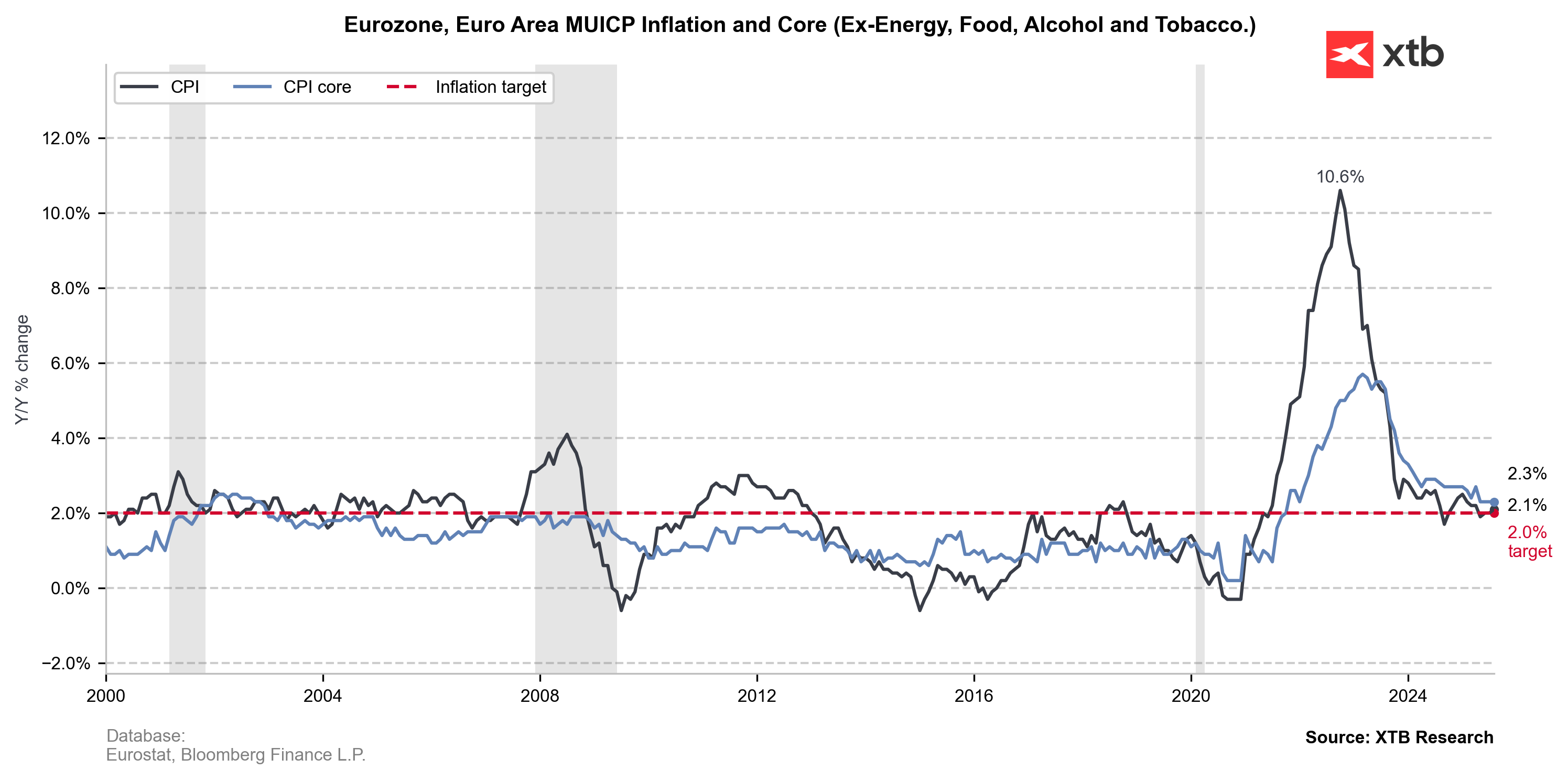
Eurozone inflation has gently rebounded from 2%, but ECB projections indicate the target will be met in the medium term. Source: XTB Research, Bloomberg Finance LP
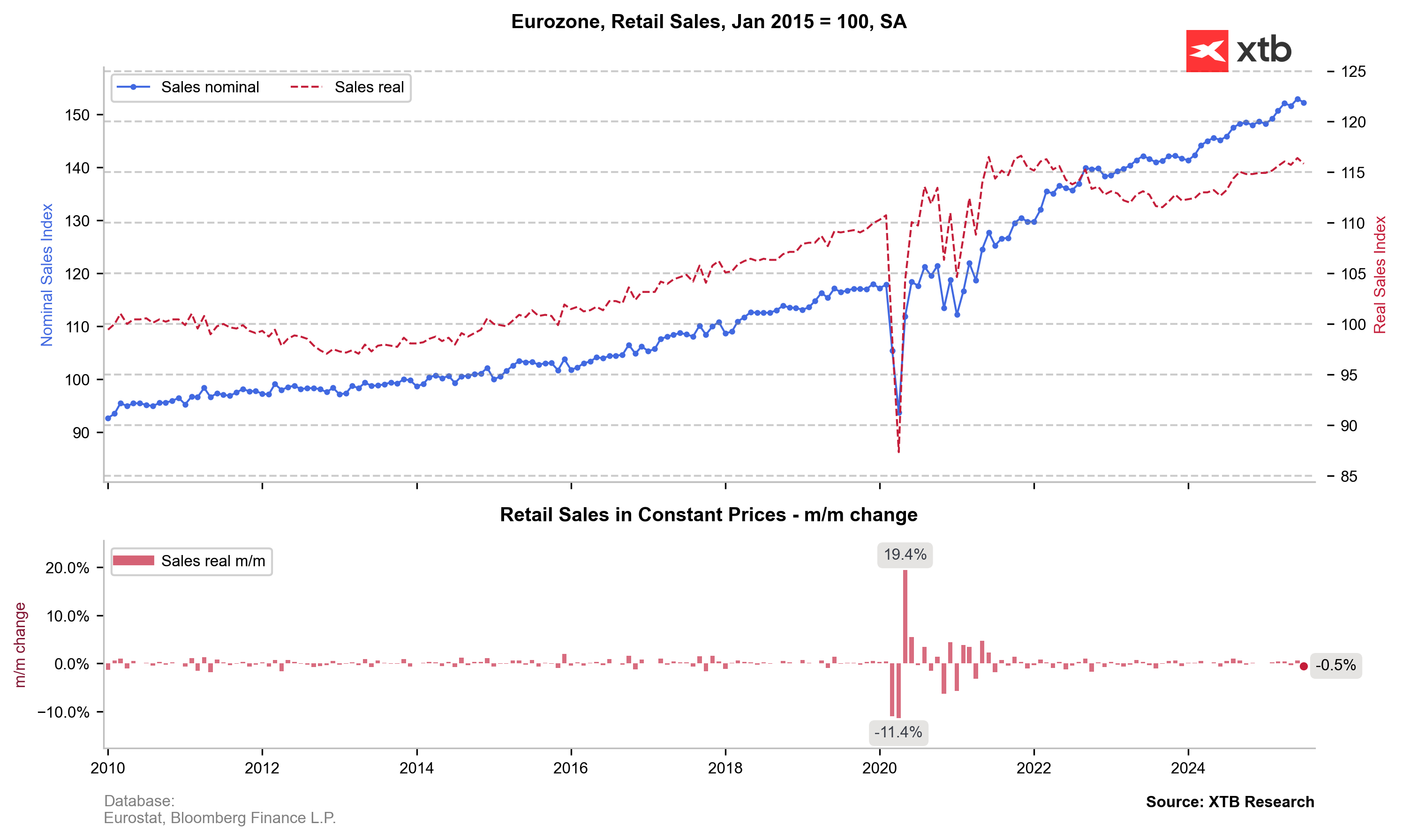
On the other hand, we have recently seen a slight weakness in retail sales, although in real terms, we have returned to the high levels of 2021. Source: XTB Research, Bloomberg Finance LP
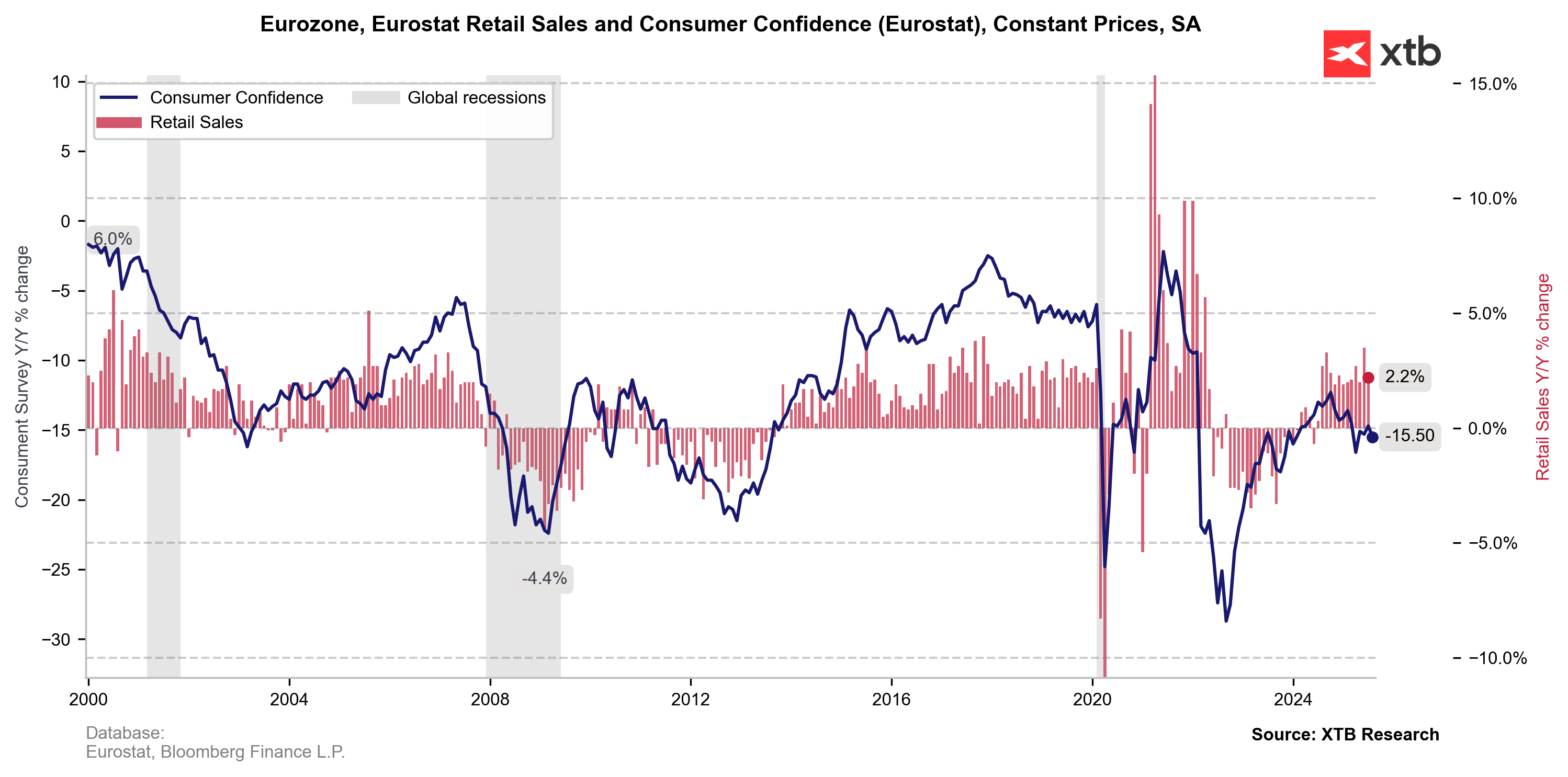

Consumer sentiment has attempted to rebound in recent months but is now trending downwards again. We have not seen a return to the 2016-2020 levels of consumer satisfaction in the eurozone. Retail sales are recovering year-on-year at a similar pace to that period, but it's important to note the low base from last year. Source: XTB Research, Bloomberg Finance LP
Economic Outlook Offers No Case for Pre-emptive Cuts
Eurozone business activity is experiencing a gradual and subdued expansion, despite persistent concerns about a decline in external demand due to Donald Trump's tariffs and continental fiscal challenges. According to August PMI data, the situation has improved in both manufacturing and services, although trends are changing in the largest EU economies.
In France, optimism is primarily driven by the highest employment growth in over a year, although companies warn that the new prime minister's proposed additional corporate taxes would primarily lead to layoffs. Conversely, a clear drop in orders has been recorded in Germany, where a combination of lagging domestic demand and high wages is forcing companies into significant restructuring.
Nevertheless, the easing of deep trade uncertainty, the gradual expansion of the business sector due to the transmission of less restrictive monetary policy, and stable inflation projections all legitimize the ECB's current pause.
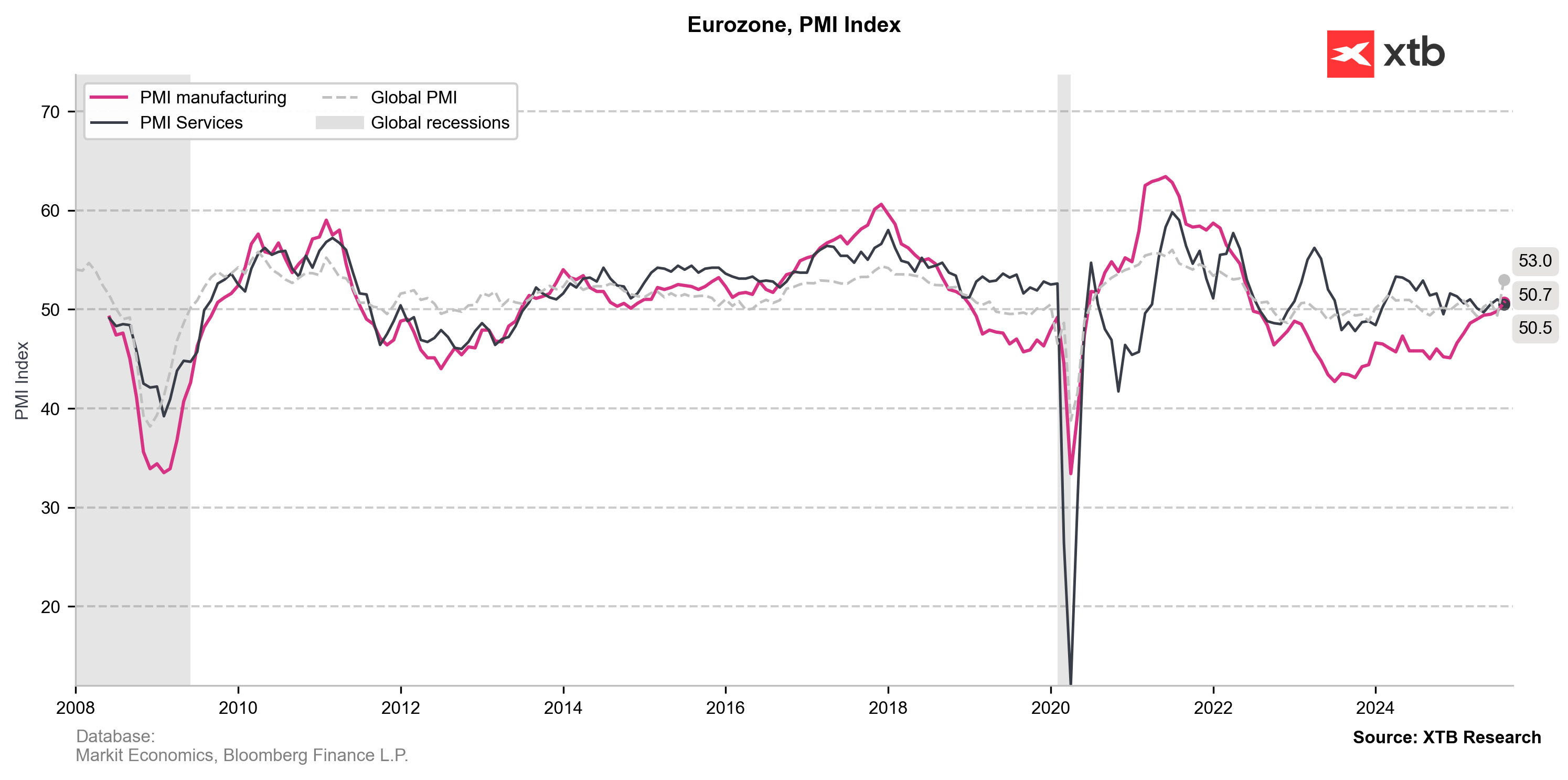
Business activity in Europe remains on the edge of expansion, far from the dynamism needed for a decisive improvement in sentiment. Nevertheless, we see a clear improvement compared to what we observed a few or several months ago. Source: XTB Research, Macrobond data
Markets Eye Stability and Potential Cuts from December
Market expectations point to no changes in interest rates for both Thursday's decision and the October meeting. A slightly higher probability is assigned to September, so any dovish statements could increase expectations for December. However, the market does not anticipate a full cut until mid-next year.
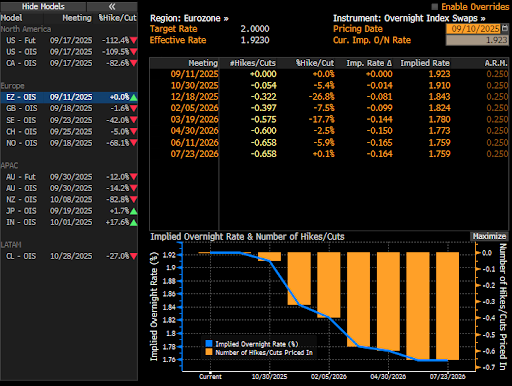
Source: Bloomberg Finance LP
EURUSD Situation
The world's most important currency pair started the week by rising to nearly 1.18, its highest level since late July. Volatility in the pair has clearly decreased as pressure on the dollar has lessened amid the trade war. However, a divergence in monetary policy between the ECB and the Fed is very close. The ECB is comfortable with its interest rates, and while the economy is not in great shape, the risk of recession seems low.
Conversely, in the US, the Fed is preparing for an entire cycle of cuts, and the labor market is sending extremely negative signals. As a result, the chances of reaching 1.20 this year remain realistic, although geopolitics could again play a significant role. If the conflict with Russia in Europe were to escalate, the euro and other regional currencies could lose value. However, if the pair reacts mainly to monetary and economic factors, the recent trend drawn by the upward trend channel may continue.
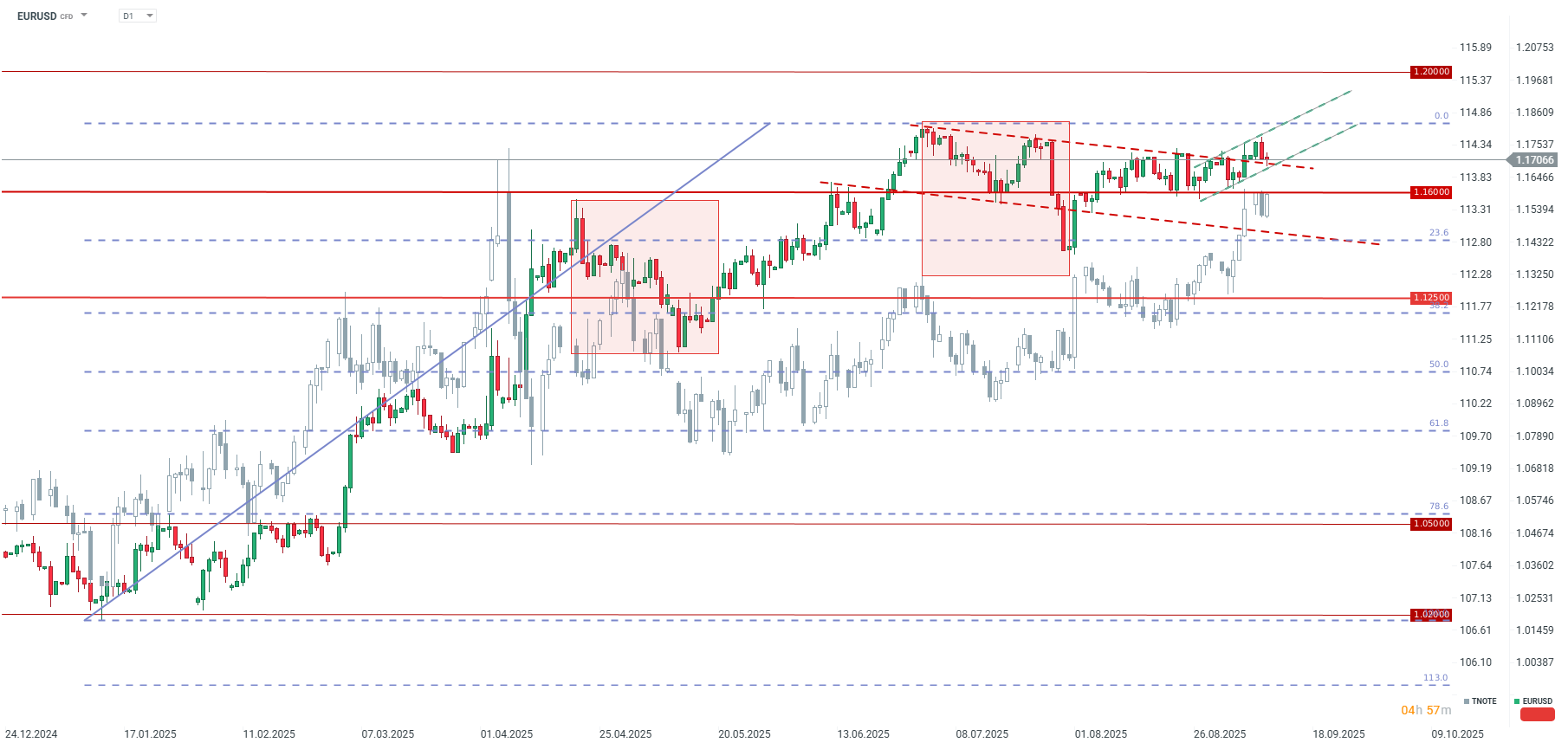

Daily Summary: Euphoria on Wall Street; SILVER rebounds 10% 📱

Three markets to watch next week (09.02.2026)

US100 gains after the UoM report🗽Nvidia surges 5%

Geopolitical Briefing (06.02.2026): Is Iran Still a Risk Factor?
The content of this report has been created by XTB S.A., with its registered office in Warsaw, at Prosta 67, 00-838 Warsaw, Poland, (KRS number 0000217580) and supervised by Polish Supervision Authority ( No. DDM-M-4021-57-1/2005). This material is a marketing communication within the meaning of Art. 24 (3) of Directive 2014/65/EU of the European Parliament and of the Council of 15 May 2014 on markets in financial instruments and amending Directive 2002/92/EC and Directive 2011/61/EU (MiFID II). Marketing communication is not an investment recommendation or information recommending or suggesting an investment strategy within the meaning of Regulation (EU) No 596/2014 of the European Parliament and of the Council of 16 April 2014 on market abuse (market abuse regulation) and repealing Directive 2003/6/EC of the European Parliament and of the Council and Commission Directives 2003/124/EC, 2003/125/EC and 2004/72/EC and Commission Delegated Regulation (EU) 2016/958 of 9 March 2016 supplementing Regulation (EU) No 596/2014 of the European Parliament and of the Council with regard to regulatory technical standards for the technical arrangements for objective presentation of investment recommendations or other information recommending or suggesting an investment strategy and for disclosure of particular interests or indications of conflicts of interest or any other advice, including in the area of investment advisory, within the meaning of the Trading in Financial Instruments Act of 29 July 2005 (i.e. Journal of Laws 2019, item 875, as amended). The marketing communication is prepared with the highest diligence, objectivity, presents the facts known to the author on the date of preparation and is devoid of any evaluation elements. The marketing communication is prepared without considering the client’s needs, his individual financial situation and does not present any investment strategy in any way. The marketing communication does not constitute an offer of sale, offering, subscription, invitation to purchase, advertisement or promotion of any financial instruments. XTB S.A. is not liable for any client’s actions or omissions, in particular for the acquisition or disposal of financial instruments, undertaken on the basis of the information contained in this marketing communication. In the event that the marketing communication contains any information about any results regarding the financial instruments indicated therein, these do not constitute any guarantee or forecast regarding the future results.


